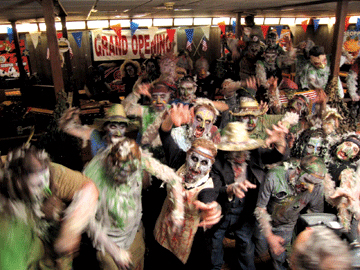
Class of ’95 | “Since childhood,” says Andy Deemer C’95 without a shred of irony, “I’ve wanted to make a zombie musical.”
It’s a bold dream, but Deemer has made it a reality—if one can use such a word in connection with Poultrygeist: Night of the Chicken Dead, the cinematic extravaganza that he produced. Directed by veteran raunchmeister Lloyd Kaufman, Poultrygeist has received critical raves, qualified by warnings about its gross content, since its initial screening last year. (Having opened in New York and Philadelphia this past May, it continues to have screenings in cities around the country—see www.poultrygeistmovie.com. Poultrygeist will be released on DVD at the end of October in a box set that includes Deemer’s documentary about the making of the movie.)
“This is a trashy movie!” Deemer is quick to say. “And yet it’s hitting something in the critical consciousness and making a mark.”
Deemer has long been enthralled with cinematic gore. “I loved horror movies as a kid, especially Return of the Living Dead,” he says. “There’s a moment in that film where a zombie tries to convince his (still alive) girlfriend to let him eat her brains. It stuck with me, the romance of it all.”
At the ripe old age of 13, Deemer penned his first idea: Romeo and Juliet, with Romeo as the leader of a pack of zombies. He rewrote the idea later as a short film with Charles Soule C’96, but it was never produced, and Deemer eventually abandoned the idea.
Then, in late 2004, Deemer happened to run into Kaufman (whose credits include The Toxic Avenger and Class of Nuke ’Em High) in a bar in Nashville, where Deemer was shooting a documentary about Islam in the South. Deemer had worked with Kaufman briefly as an undergraduate, co-writing the first draft of the cult hit Tromeo & Juliet (an adaptation of that aforementioned Shakespeare work, albeit with a lot more sex and violence).
“Over glasses of Wild Turkey in Nashville, he told me about his latest doomed project—a musical comedy horror film, at that point titled ‘Poultrygeist: Attack of the Chicken Zombies,’” Deemer recalls. “As soon as he started to tell me the plot—a KFC is built on the remains of an ancient Indian burial ground—I was hooked. I saw this as a moment of kismet, and couldn’t let it go. A week or two later, unable to shake the suspicion that this was a chance that I’d never have again, I dropped the documentary, and moved to New York to make this zombie musical.”
The film took three years from start to finish, and cost just shy of half a million dollars.
“For two or three of those months, I was actually working 122 hours a week,” Deemer says. “I hadn’t realized that there were that many hours in a week! It reminded me of start-up-dot-com life, and also, funnily enough, of the hours I spent as photo editor at the DP.”
The film was shot in Buffalo to keep expenses down. “The stars and producers slept five-to-a-room, and the rest of the crew—many of whom flew in from around the world to work on the film for free—slept on the floor in the basement,” recalls Deemer. “Mostly, people put up with the long hours and hard living. There were some fights, and several muggings, on set, but in the end it was no worse than Philly in the early ’90s.”
The first 10 minutes of Poultrygeist contain a scene so breathtakingly disgusting that it truly defies words, at least the kind that can be used in an alumni magazine. From that point on, the film is a veritable roller coaster of blood, puke, political satire, musical numbers, and massacres. No plot summation could do it justice.
“Disgusting, deranged, and thoroughly brilliant,” was the verdict of Salon.com, while The New York Times called it “just about as perfect as a film predicated on the joys of projectile vomiting and explosive diarrhea can be.”
Politically, its biting wit leaves no viewpoint untouched.
“Poultrygeist definitely has it in for the fast-food industry, and big business overall: Colonel Sanders is a racist plantation owner who puts profits before human life; the zombies slaughter the humans in the same ways that meat-eaters slaughter animals,” Deemer says. “Just like in [George] Romero’s Dawn of the Dead, the zombies are a metaphor for the consumption-obsessed society we’ve become.”
The film has gained a lot of traction with that angle. People for the Ethical Treatment of Animals (PETA), for example, called it one of the “top 10 films that’ll inspire you to go vegetarian.”
“But, at the same time, the movie completely slaughters the other side—liberal hypocrites,” Deemer notes. “The protesters outside the KFC are fighting big business, while drinking Starbucks and wearing Tevas. They’re carrying signs that praise one cause (chicken rights) while mocking another (Tibet). The left-leansing characters in the film spew their political rhetoric, but are terrified of the burqa-clad Muslim. This hypocrisy is everywhere.
“The film challenges the audience, and offers them the chance to decide,” he adds. “Should the audience laugh at the horrible line about cross-burning, or the gags about Al Jazeera? Or should they be offended? The audiences I’ve been with have laughed, and then gone quiet, as they realize what they’d just been laughing at. It’s interesting. We do present some offensive moments in the film—and it’s up to the viewer as to how they’re received.”
—Jordana Horn C’95 L’99




